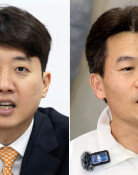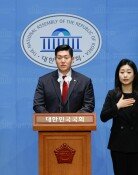Illegal outsourcing
The Supreme Court has upheld a ruling that GM Daewoo Auto & Technology (now GM Korea) illegally used workers originally hired from subcontractors at its assembly lines. After an investigation, the Employment and Labor Ministry found that E-Mart, one of Koreas largest retailers, illegally used nearly 2,000 sales staff. The decisions have put the brakes on a prevalent labor practice by similar companies. Such irregular employees receive about 60 percent of what their regular peers make and are the first to be laid off when the economy is in a slump. Korea has about six million irregular workers, and nearly 12 percent of them are employed by subcontractors to work for the prime contractor.
Choi Byeong-seung, who was employed by Yeseung Company but worked at an assembly line at Hyundai Motors main production plant in Ulsan, has been protesting the automakers labor practice on top of a 50-meter-high power transmission tower in front of the plant for more than four months. After a prolonged lawsuit, he was recognized as a Hyundai employee in February last year by a Supreme Court ruling. But he refused to go back to work by himself, demanding that all 7,700 outsourced workers be recognized as permanent staff.
Hyundai Heavy Industries, one of the worlds largest shipbuilders, also has a great number of outsourced workers. The practice of using outsourced labor is illegal at automakers, but legal at shipbuilders. The difference lies in who manages labor. For instance, a shipbuilder outsources a certain task to a subcontractor, which will provide staff and managers to do the job. Automakers and retailers, however, have their own employees supervise outsourced workers. Such a practice is allowed only in a limited number of industries that require expert knowledge or skills. It is illegal for companies in manufacturing and the service industry to use such labor.
Irregular workers are creating a peripheral class that has grown too big to ignore. Few businesses, however, can afford to make all of their irregular workers permanent. Efforts to help irregular workers can result in their massive layoff. The number of irregular workers has been increasing since the 1997 financial crisis, when the negotiating power of job seekers weakened significantly. Employers only protected the job security of regular staff and passed on the burden of labor cost to irregular workers. Regular workers condoned such practices as long as their interests were not affected. Irregular employment cannot be resolved if regular workers as well as their employers refuse to make concessions. Yet powerful labor organizations such as the Federation of Korean Trade Unions and the Korea Confederation of Trade Unions want the abolition of irregular employment but show no sign of making concessions.
Editorial Writer Heo Seung-ho (tigera@donga.com)







